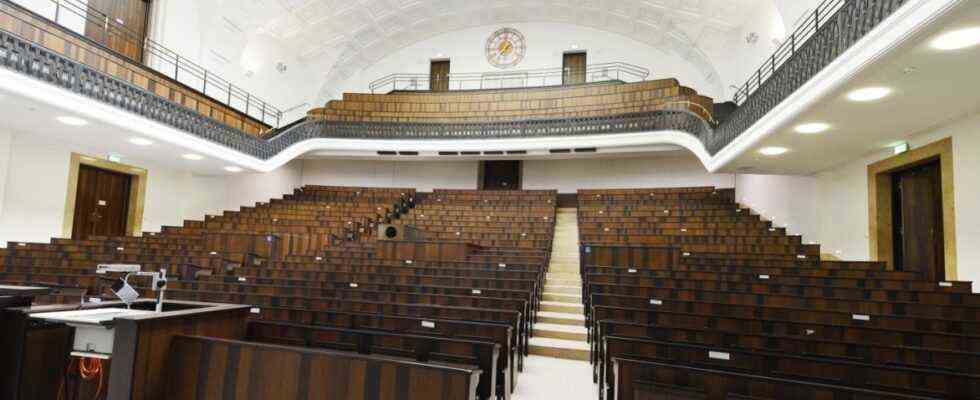The halls of the Ludwig Maximilians University are getting emptier and more desolate. A month or two ago, hundreds of masked students were walking through the corridors, looking for the right lecture hall. Many freshmen saw their university for the first time, many higher semesters too. Today only a few isolated figures scurry shyly through the large arches and up the long stairs. The reason for the lack of young people is obvious: Corona. The 2-G rule has been in effect at universities since Wednesday, November 24th. The decision as to whether a course takes place online, face-to-face or hybrid rests with the lecturer. Even before the introduction of the 2-G rule at universities, many lecturers canceled face-to-face events. The universities do not have exact figures, but they assume that the majority of the courses are now back online.
This frustrates many students, because now, like the year and a half before, they are back at home at their desks. “I don’t feel like sitting in my mini-room anymore,” complains architecture student Nils. His semester started with most of the face-to-face events; eight out of ten are now online. Political student Joana also hopes for attendance, “these are the only lectures in which I am mentally present”.
After the Bavarian Prime Minister Markus Söder mentioned in a subordinate clause during the press conference on Friday, November 19, that 2G applies at Bavarian universities, there was initially confusion at the universities. On the Monday after the press conference, there were still questions unanswered: Does this also apply to teachers? Will a hybrid apprenticeship be compulsory? Do exams also have to take place under 2G?
The only announcement by the Bavarian state government to the universities was said subordinate clause Söders at the press conference, says Ulrich Meyer, the press spokesman for the Technical University (TU) Munich. “We’re in the air,” he said.
In the course of the week, the Bavarian Ministry of Science then added something to the clarification. For the staff of the Bavarian universities only a 3-G-plus rule applies – i.e. vaccinated, recovered or with a valid PCR test. In the case of exams, only 3G plus applies to candidates, and there is no obligation for lecturers to also offer face-to-face courses online – i.e. hybrid.
The rules are not always clearly enforced
But these regulations are apparently not that clear after all, because the legal state exams currently taking place run completely without any G-regulations. In making this decision, the responsible State Judicial Examination Office relies on the fact that the applicable regulations explicitly do not apply to “already ongoing” examinations.
The state exams began on Tuesday, November 23rd, and the regulations came into force one day later. A candidate who wishes to remain anonymous, however, condemns this legally presumably unobjectionable decision and describes it as “irresponsible and grossly reckless”.
He expressed concern that the exams could develop into a “super spreader event”, as 150 people without wearing a mask would gather in an indoor space for five hours on the following eleven days of the week. The State Judicial Examination Office announced that at least the oral state exams would take place with a 3-G-plus rule.
There are still problems with the implementation of the 2-G rule. At the beginning of the semester, the Munich universities still relied on strict controls of the evidence at the entrances. Since November at the latest, however, these have only been checked on a random basis.
Luise Lorentz, who studies tourism management at the Munich University of Applied Sciences, says that she has only been checked once since the switch to random samples. That’s why some lecturers also check the courses, but that doesn’t always work well, says Lorentz.
The university only controls randomly – for financial reasons
A teacher’s check once consisted of asking in the room whether everyone had been vaccinated and then waiting for those present to nod. The Munich University of Applied Sciences justified its decision to only carry out random checks with financial reasons.
The permanent guarding of the entrances required 60 security guards and cost more than 200,000 euros per month. The random checks are like ticket controls for the MVG, says the university’s press spokeswoman, Christina Kaufmann: Sometimes you are not checked for months, sometimes for two days in a row. What counts is awareness of negative consequences.
This is not enough for many students at the LMU either, which is why a group of students sent a letter to the LMU Presidium and called for stricter controls, among other things. So far there has been no answer.

